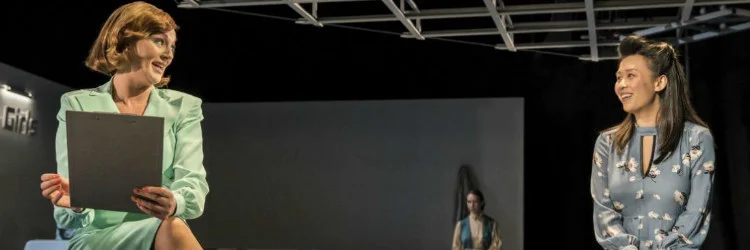Review - Caryl Churchill's Top Girls at the National Theatre
Emilia may be making a splash in the West End right now for being a new play by a woman playwright with an all-female cast (and lead producers and creative team, too). But 37 years ago Caryl Churchill paved the way with Top Girls; and a play that was once of its time now proves to be a play for all time, as it is brought to the top table of the National Theatre for the first time.
The play has been the source of many unfolding conversations and controversies in its time - it was originally premiered at the Royal Court under the direction of then-artistic director Max Stafford-Clark in 1982, who was outed (and ousted from the company he subsequently founded Out of Joint) in one of British theatre's first post-Weinstein #MeToo reckonings 18 months ago.
Now it arrives at the NT hard upon the recent uproar over the lack of female representation in the next season there, with no female playwrights, living or dead, among the slate of four new productions that have been announced.
So this play about female aspiration, inspiration and workplace achievement couldn't come a timelier moment to continue that conversation whilst also providing some redress to it. (Of course, the announcement of a new booking period which ignited the furore is only a snapshot of a theatre's output for this particular time, not its entirety, but the protestors don't restrain or detain themselves by taking a longer view).
For all the enduring audacity of Churchill's play, director Lyndsey Turner's new production slightly mutes some of its impact with designer trickery. The high, wide stage of the Lyttelton is shrunk to a small cinema screen size for the opening scene set in a trendy restaurant, where fictional and real characters from history assemble for a dinner party at the invitation of Marlene, the boss of a modern-day female employment agency, as if it were a networking opportunity.
As Turner's cast talk over and interrupt each other constantly, there's not much listening going on (which may be the point), but it's hard to care about what any of them are saying if they don't, either. The next scene, as two young girls huddle in a basement, is smaller: the space is just a tiny cube at the centre of the stage. Then we're at the oddly arranged, generic offices of the employment agency.
All the strands finally come together in the rustic country home of Joyce, older sister of Marlene as the two siblings experience a rare reunion, but old resentments quickly flare up; and a painful family history is laid bare. This is easily the best scene in this production, played to tough yet poignant perfection by Katherine Kingsley as Marlene, Lucy Black as her sister Joyce and Liv Hill as daughter Angie.
Top Girls remains an important, forever relevant and still surprising play, even in a production that doesn't always hit its marks.
Top Girls is at the National Theatre unti 22nd June.
Photo credit: Johan Persson
Originally published on
